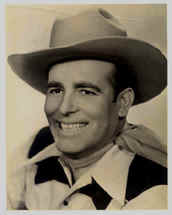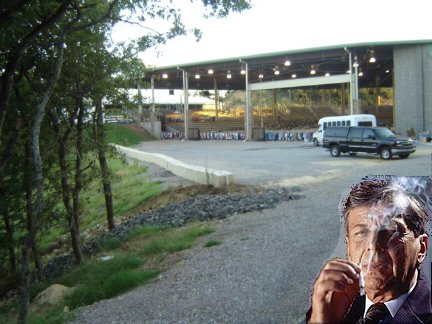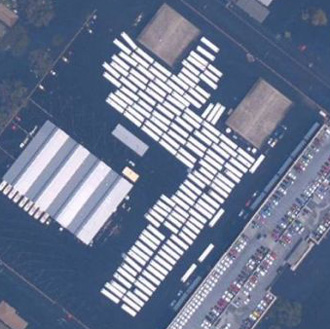Casa Bonita raises the white flag
Tonight was the last night of sopapillas at 21st and Sheridan, after nearly 25 35 years. (NOTE: I can do math, but I guess I just couldn't believe that I'm old enough for it to have been nearly 35 years since I went to Casa Bonita for the first time.) Tom Baddley of Lost Tulsa has exterior photos of Casa Bonita's next to last night -- the line was too long to allow him in to take interior photos. He's also got photos of soon-to-be-lost Starship Records and on-the-way-to-being-lost Eastland Mall.
According to this article, Tulsa's Casa Bonita cost nearly $4,000,000 -- that's in 1971 dollars. Although I'm sure the owners long since recouped their investment, it still amazes me that something that cost that much to build could just shut down in a week's time because the restaurant and the shopping center couldn't come to terms on a new lease.
I remember a 2nd grade classmate bragging about being the first one in class to eat there. Our family went the night before I started 3rd grade -- September 1971 -- which also happened to be the night before my first day of school at Holland Hall. I remember that they had a map, just like an amusement park. We were there with my dad's dad and some other relatives. We ate in the cantina, which in recent years was a theatre for magic and puppet shows. I remember being quietly appalled at the mushy slimy green stuff the grownups were enjoying and even more nauseated that they could follow guacamole with a dessert of strawberry shortcake back at the house. (I'm sure that nerves about starting at a new school intensified the effect of the strange cuisine.)
Other random Casa Bonita memories: The Acapulco (waterfall) room wasn't there when the restaurant first opened. Tulsa never had the cliff divers that they had in Denver. The game room was a later addition, too. Once upon a time, there was a custom bra shop next door which prominenly displayed the smallest and largest sizes they offered. One of the treats in the treasure room were these little candy-coated malt balls, about eight or nine in a cellophane tube.
In recent years, our family went about once a year. The kids enjoyed the game room as much or more than the food and atmosphere.
There's still a Casa Bonita in Denver, and you might get to go, assuming Eric Cartman doesn't trick you into believing that a meteor is heading toward Earth so he can take your place.
MORE: Joel Blain has a last-day picture of Casa Bonita.
(Update your bookmarks -- Lost Tulsa is now at http://www.losttulsa.com.)
UPDATE 10/1: Weep not for Casa Bonita. According to a story in today's Whirled, the founder of Casa Bonita will open his second Casa Viva restaurant in the same space later this year. The first is in an old Casa Bonita in Little Rock. The atmosphere and the little flags will be the same, but they promise the food will be better. Waugh Enterprises also owns the Burger Street chain and a fast-food Mexican chain called Taco Viva.







